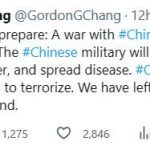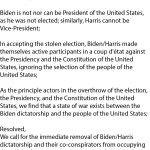-
The legal authority to convene the State Legislature to examine election fraud, and directly select electors
Senator Sylvia Allen (AZ):
I heard that in the Arizona hearings regarding election integrity you asked about the constitutional ability of the Arizona legislature to convene itself to determine if the presidential election has been conducted in a manner as you have directed, and, also, to remedy the untrustworthy implementation of the count by directly selecting a slate of electors.
I am convinced that a study of the Constitution and Supreme Court precedent reveal that you do, indeed, as a state legislator, have the plenary power under Article II of the United States Constitution to work with your fellow legislators, and to call the legislature into session for such a purpose, even if the Arizona Constitution and statutes dictate that normally the legislature does not.
I think that the authorities I will quote and the articles I link to below will demonstrate that Article II trumps (no pun intended) the Arizona legal regime for other circumstances.
First,, here are quotes from Bush v Gore and McPherson v. Blacker that Mayor Guiliani referenced, today:
“The State, of course, after granting the franchise in the special context of Article II, can take back the power to appoint electors. See [McPherson v. Blacker, 146 U.S. 1,] 35 (1892)“ ‘[T]here is no doubt of the right of the legislature to resume the power at any time, for it can neither be taken away nor abdicated’” Bush v. Gore, 531 U.S. 98, 104 (2000).
The McPherson case quoted former Justice Joseph Story from his Commentaries on the Constitution where he said that “direct choice by the legislature” of electors “has been firmly established in practice ever since the adoption of the Constitution, and does not now seem to admit of controversy even if a suitable tribunal existed to adjudicate upon it.” (emphasis added). Clearly the judiciary has never thought it had the power to tell state legislatures how to pick its electors.
Chief Justice Fuller hammered the point home in McPherson: “The power and jurisdiction of the state is exclusive.” And “The question before us is not one of policy, but of power.”
Daniel Horowitz in this article (in a follow up to his original article) answers your question this way:
“In some states, the legislature cannot convene a special session outside the regular session (typically in January) without the consent of the governor. Lawmakers from these states are concerned that they might not be able to convene without the green light from a Democrat governor who clearly has no interest in further investigating election fraud.
Other legislators have raised questions about whether they can reclaim their constitutional power to select the electors after they have already delegated the authority to the political parties based on the winner of the popular election.
The answer to both of these concerns lies in federal law. 3 U.S.C. §2 states clearly:
“Whenever any State has held an election for the purpose of choosing electors, and has failed to make a choice on the day prescribed by law, the electors may be appointed on a subsequent day in such a manner as the legislature of such State may direct.”
Thus, even if we accept the argument that legislators cannot abolish popular elections and return to the original practice without passing a new statute (which would require the signature of the governor), that is not what they would be doing here. There has already been a popular election. And assuming the results remain contested and unclear, federal law dictates they alone are responsible for resolving it. Given the existing plenary power to select electors, plus the power of Congress to set the time for voting on them (and Congress gave the authority to the legislators to control that process), it’s hard to see how any other state law would supersede such power in this case – at least as it relates to the presidential election.”
My friend, Tom Glass, wrote two articles on the general topic of the role of the state legislatures in elector selection as well.
Presidential Endgame Being Set Now
https://www.texasfreepress.com/post/presidential-endgame-being-set-now?postId=5fc5243d333db100173f7b56State Legislatures’ Exclusive Power to Choose Electors
https://www.texasfreepress.com/post/state-legislatures-exclusive-power-to-choose-electors?postId=5faef9df3546e1001722e411Thank you for being willing to do your constitutional duty to protect rule of law, election integrity, state sovereignty, and liberty. I hope this helps.
For Life and Liberty,
David C. Treibs
This is a mostly verbatim copy of a letter written by Tom Glass.






















